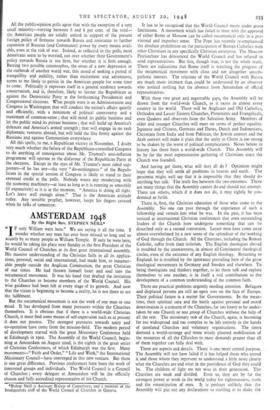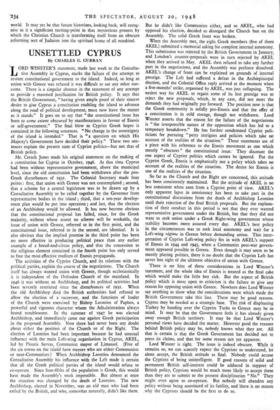• AMSTERDAM 1948 By the Right Rev. STEPHEN NEILL* T
F only William were here." We are saying it all the time. I
I wonder whether any man has ever been missed so long and so acutely by so many people as William Temple. If only he were here, he would be taking his place next Sunday as the first President of the World Council of Churches at its first great international assembly. His massive understanding of the Christian faith in all its applica- tions, personal, social and international, had made him, to innumer- able people outside the Anglican Communion, the great Christian of our times. He had thrown himself heart and soul into the oecumenical movement. It was his hand that drafted the invitation to the Churches to become members of the World Council. His wise guidance had been felt at every stage of its growth. And now that the vision is beginning to become a reality, he is not there to see the fulfilment.
But the oecumenical movement is not the work of one man or one mind. It has developed from many pressures within the Churches themselves. It is obvious that if there is a world-wide Christian Church, it must find some means of self-expression such as at present it does not possess. The strongest pressures towards unity and co-operation have come from the mission-field. The modern period of development started with the great Missionary Conference held at Edinburgh in 1910. The Assembly of the World Council, begin- ning at Amsterdam on August 22nd, is the eighth in the great series of Christian Conferences, of which Edinburgh was the first. Many movements—" Faith and Order," "Life and Work," the International Missionary Council—have converged in this new venture. But there is one great difference. Previous conferences have been the work of interested groups and individuals. The World Council is a Council of Churches ; every delegate at Amsterdam will be the officially chosen and fully accredited representative of his Church.
*Bishop Neill is Assistant Bishop of Canterbury, and a member of the headquarters staff of the World Council of Churches in Geneva, It has to be recognised that the World Council meets under grave limitations. A movement which has failed to meet with the approval of either Rome or Moscow can be called oecumenical only in a pro- visional and imperfect sense. The Pope has recently re-emphasised the absolute prohibition on the participation of Roman Catholics with other Christians in any specifically Christian enterprise. The Moscow Patriarchate has denounced the World Council and has refused to send representatives. But this, though true, is not the whole truth. There are indications that Rome itself is watching the progress of the oecumenical movement with close and not altogether unsym- pathetic interest. The relations of the World Council with Russia are much more intimate than could be understood by an observer who noticed nothing but the absence from Amsterdam of official representatives.
With these two great and regrettable gaps, the Assembly will be drawn from the world-wide Church, as it exists in almost every country in the world. There will be Anglicans and Old Catholics, Orthodox and Lesser Eastern Churches, Protestants and Evangelicals, even Quakers and observers from the Salvation Army. Members of older and younger Churches will meet on terms of perfect equality. Japanese and Chinese, Germans and Danes, Dutch and Indonesians, Christians from India and from Pakistan, the Jewish convert and the Arab convert will make it plain that the unity in Christ is too strong to be shaken by the worst of political complications. Never before in history has there been a world-wide Church. This Assembly will be by far the most representative gathering of Christians since the Church was founded.
And having got there, what will they all do ? Optimism might hope that they will settle all problems in heaven and earth. The pessimist might well say that it is impossible that they should do anything but talk. The truth lies between the two extremes. There are many things that the Assembly cannot do and should not attempt. There are others, which if it does not do, it may rightly be con- demned as futile.
There is, first, the Christian education of those who come to the Assembly. No one can pass through the experience of such a fellowship and remain just what he was. In the past, it has been noticed at international Christian conferences that even outstanding leaders of the Church have undergone something that can be described only as a second conversion. Lesser men have come away almost overwhelmed by a new sense of the splendour of theeworking of God through the Church. All the Churches, including the Roman Catholic, suffer from their isolation. The English theologian abroad is troubled by the unawareness, in almost all Continental theological circles, even of the existence of any English theology. Returning to England, he is troubled by the ignorance prevailing here of the great theological movements in Germany and Sweden and elsewhere. To bring theologians and thinkers together, to let them talk and explain themselves to one another, is in itself a real contribution to the development of a common understanding of the common faith.
There are practical problems urgently needing attention. Refugees and displaced persons are still an open sore on the face of Europe. Their political future is a matter for Governments. In the mean- time, their spiritual care and the battle against personal and moral deterioration is a concern of the Churches, far too heavy to be under- taken by one Church or one group of Churches without the help of all the rest. The missionary task of the Church, again, is becoming far too widespread and too complex to be left entirely in the hands of unrelated Churches and voluntary organisations. The times demand a world-strategy and more wisely planned mobilisation of the resources of all the Churches to meet demands greater than all of them together can fully deal with.
These are aspects and details. There is one more central purpose. The Assembly will not have failed if it has helped those who attend it and those whom they represent to understand a little more clearly what the Churches are and what in the providence of God they could be. The children of light are not wise in their generation. The Churches are weak and divided. Even so, they are by far the strongest power at work in the world today for righteousness, truth and the emancipation of man. It is perhaps unlikely that the Assembly will put out any declarations so startling as to shake the world. It may yet be that future historians, looking back, will recog- nise in it a significant turning-point in that mysterious-process by which the Christian Church is transforming itself from an obscure reforming sect of Judaism into the spiritual home of all mankind.



































 Previous page
Previous page